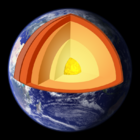Difference between revisions of "Material/Twenty most abundant elements in Earth's crust"
From AdCiv
< Material
| Line 6: | Line 6: | ||
! style="background:#E5E5E5;" width="150px" align="left" | Element !! style="background:#E5E5E5;" width="80px" align="right" | % mass | ! style="background:#E5E5E5;" width="150px" align="left" | Element !! style="background:#E5E5E5;" width="80px" align="right" | % mass | ||
|- | |- | ||
| − | | {{ | + | | {{wp4|Oxygen}}|| align = "right" | 46.71 |
|- | |- | ||
| − | | {{ | + | | {{wp4|Silicon}}|| align = "right" | 27.69 |
|- | |- | ||
| − | | {{ | + | | {{wp4|Aluminum}}|| align = "right" | 8.07 |
|- | |- | ||
| − | | {{ | + | | {{wp4|Iron}}|| align = "right" | 5.05 |
|- | |- | ||
| − | | {{ | + | | {{wp4|Calcium}}|| align = "right" | 3.65 |
|- | |- | ||
| − | | {{ | + | | {{wp4|Sodium}}|| align = "right" | 2.75 |
|- | |- | ||
| − | | {{ | + | | {{wp4|Potassium}}|| align = "right" | 2.58 |
|- | |- | ||
| − | | {{ | + | | {{wp4|Magnesium}}|| align = "right" | 2.08 |
|- | |- | ||
| − | | {{ | + | | {{wp4|Titanium}}|| align = "right" | 0.62 |
|- | |- | ||
| − | | {{ | + | | {{wp4|Hydrogen}}|| align = "right" | 0.14 |
|- | |- | ||
| − | | {{ | + | | {{wp4|Phosphorus}}|| align = "right" | 0.13 |
|- | |- | ||
| − | | {{ | + | | {{wp4|Carbon}}|| align = "right" | 0.09 |
|- | |- | ||
| − | | {{ | + | | {{wp4|Manganese}}|| align = "right" | 0.09 |
|- | |- | ||
| − | | {{ | + | | {{wp4|Sulfur}}|| align = "right" | 0.05 |
|- | |- | ||
| − | | {{ | + | | {{wp4|Barium}}|| align = "right" | 0.05 |
|- | |- | ||
| − | | {{ | + | | {{wp4|Chlorine}}|| align = "right" | 0.05 |
|- | |- | ||
| − | | {{ | + | | {{wp4|Chromium}}|| align = "right" | 0.04 |
|- | |- | ||
| − | | {{ | + | | {{wp4|Fluorine}}|| align = "right" | 0.03 |
|- | |- | ||
| − | | {{ | + | | {{wp4|Zirconium}}|| align = "right" | 0.03 |
|- | |- | ||
| − | | {{ | + | | {{wp4|Nickel}}|| align = "right" | 0.02 |
|} | |} | ||
| + | |||
| + | Notable missing from top 20: | ||
| + | * {{wp4|Copper}}.<br><small>Carbon might replace copper for many electrical (and thermal) conduction applications - see [http://www.unidym.com/technology/cnt_property_electrical.html], [http://www.scienceblog.com/cms/ub-engineers-prove-carbon-nanotubes-are-superior-metals-electronics-19679.html] and {{wp|Carbon_nanotube|carbon nanotube}} for further information</small> | ||
<font size=1>''Figures from [http://www.science.co.il/PTelements.asp?s=Earth]''<br> | <font size=1>''Figures from [http://www.science.co.il/PTelements.asp?s=Earth]''<br> | ||
''Figures rounded to two decimal places''<br> | ''Figures rounded to two decimal places''<br> | ||
| − | ''Also need to have a list based on ease of extraction and energy required''< | + | ''Also need to have a list based on ease of extraction and energy required''<br> |
| − | + | ''Element links in list point to Wikipedia page''</font> | |
| − | + | ||
| − | + | ||
Revision as of 01:01, 12 January 2010
Approx figures for the 20 most abundant elements in Earth's crust:
| Element | % mass |
|---|---|
| Oxygen | 46.71 |
| Silicon | 27.69 |
| Aluminum | 8.07 |
| Iron | 5.05 |
| Calcium | 3.65 |
| Sodium | 2.75 |
| Potassium | 2.58 |
| Magnesium | 2.08 |
| Titanium | 0.62 |
| Hydrogen | 0.14 |
| Phosphorus | 0.13 |
| Carbon | 0.09 |
| Manganese | 0.09 |
| Sulfur | 0.05 |
| Barium | 0.05 |
| Chlorine | 0.05 |
| Chromium | 0.04 |
| Fluorine | 0.03 |
| Zirconium | 0.03 |
| Nickel | 0.02 |
Notable missing from top 20:
- Copper.
Carbon might replace copper for many electrical (and thermal) conduction applications - see [1], [2] and carbon nanotube for further information
for further information
Figures from [3]
Figures rounded to two decimal places
Also need to have a list based on ease of extraction and energy required
Element links in list point to Wikipedia page

